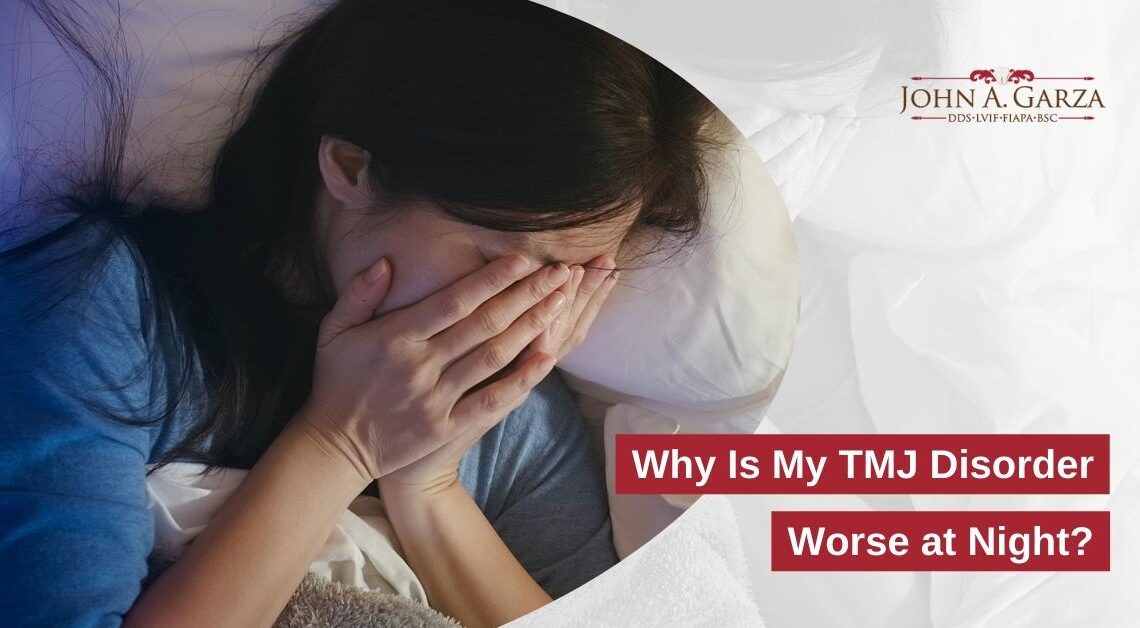Jaw, neck, and facial pain can be caused by temporomandibular joint dysfunction (TMJ) or TMD. Teeth grinding and jaw clenching can also lead to sleep deprivation, which can lead to exhaustion. TMJ and sleeping positions directly correlate; you may unknowingly increase your disease while you sleep.
Sleeping with TMJ can pose a challenge to people suffering from it. In this article, we’ll explore why TMJ feels worse at night and how to ease your discomfort.
What is TMJ?
An important part of your jawbone and skull is called the temporomandibular joint (TMJ). Each side of your jaw has a TMJ. A variety of conditions can irritate or damage the jaw joint by causing discomfort in the TMJ. Many different things can contribute to these issues, but habitual nighttime teeth grinding is one of the most common. These difficulties can be brought on by trauma, repetitive motion, genetics, or even arthritis (also known as bruxism).
Teeth grinding can be alleviated by various methods, including surgery, dental appliances, and behavioral changes.
Why Does My TMJ Disorder Feel Worse at Night?
TMJ is worse at night because teeth grinding and jaw clenching are more common during sleep. As your body works to maintain your airway open while you sleep, you’ll clench your teeth during the night.
How to Relieve TMJ Pain
For individuals with TMJ disorders and pain, it is crucial to comprehend the significance of proper neck and head support. Investing in pillows that provide this support helps reduce muscular stress and overcompensation in the face and neck.
Prioritize support – some softer, flatter pillows may be your personal preference, but locating a pillow with moderate to high support might make all the difference.
Finding a sleeping posture that does not strain your head or neck is also essential. Finding sleep postures that do not promote teeth grinding or jaw clenching is also excellent; please inform your TMJ specialist if you experience these concerns while sleeping. They can supply you with specific oral appliances to wear at night that can aid in the treatment of these disorders.
How to Sleep at Night with TMJ Disorder
Stress on the head, neck, face, or jaw can exacerbate TMJ symptoms. The presence of increased jaw pain upon awakening may indicate that your sleep posture is aggravating your symptoms. A person’s sleeping posture may influence multiple factors that lead to jaw pain.
Sleeping on the stomach or side
Depending on the location of the sleeper’s head, this may force the jaw back towards the skull or to the side. This increased jaw pressure can exacerbate symptoms. Additionally, sleeping with the head turned to the side may cause stress that exacerbates TMJ.
Sleeping on the back
In addition to alleviating discomfort, this posture is recommended for those who suffer from headaches, neck pain, or shoulder pain since it relieves strain on the jaw, aligns the head and neck, and gives additional support for the head, neck, and shoulders. However, it is necessary to keep the head in a neutral position so as not to strain the neck. Neck strain can be caused by back sleepers pushing their heads up with their hands or using pillows that are either excessively hard or too thick.
Training the tongue to sit on top of the teeth reduces jaw pressure even further. In order to prevent teeth clenching or grinding, it is important to relax the tongue over your teeth, keeping the jaw slightly open.
If you suffer from diseases like sleep apnea or acid reflux, it is best to avoid sleeping on your back. Consult a doctor if you have health conditions that may be affected by your sleep patterns. TMJ therapy may be possible if you change your sleep positions.
Side Effects of TMJ
American adults appear to be under a lot of pressure these days. As we cope with an unprecedented pandemic, we also have to deal with the continual stress of money, work, job stability, the economy, and other responsibilities like family and relationships and our health. Teeth grinding is a common symptom of anxiety and stress. While we sleep, our teeth are most likely to grind against each other.
Acid reflux, ADHD, and sleep apnea can all cause nighttime bruxism. Anxiolytic drugs may cause it as a side effect. So, if you wake up in the middle of the night with discomfort in your mouth or jaw, you’re likely grinding your teeth while you sleep. It is possible to have a better night’s sleep by seeing your family dentist, especially one who uses neuromuscular dentistry.
Can a Night Guard Make TMJ Worse?
Nightguards do not exacerbate TMJ, but they also significantly improve it. Clenching and grinding teeth can induce headaches and migraines. Nightguards can help alleviate these symptoms. A night guard is a small, inconspicuous gadget, usually made of clear plastic. It protects the upper and lower teeth from coming into touch with one other.
Consult with Garza DDS to learn more about TMJ worse at night
If you’re struggling with sleep deprivation, it might be time to consult with Garza DDS. We can help identify whether or not TMJ is the cause of your restless nights and help you restore your quality of life. Don’t suffer through another day feeling exhausted – call us today!


